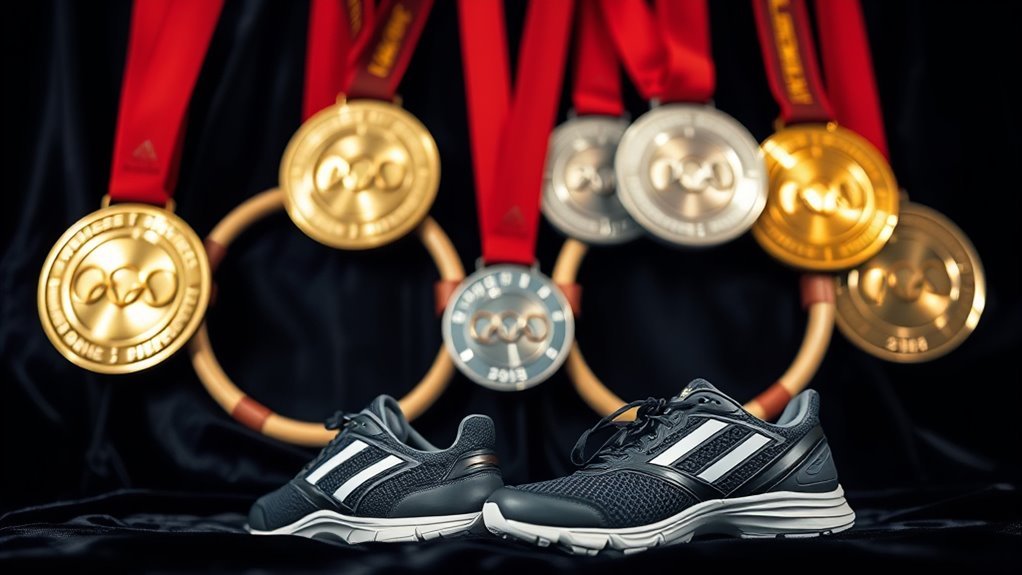If you’re curious about the athlete with the most Olympic medals, it’s Michael Phelps. With an astounding total of 28 medals, he holds the record for the most decorated Olympian in history. Phelps’ journey includes epic performances like his incredible 8 gold medals at the 2008 Beijing Olympics. His impact extends beyond the pool, shaping the sport and inspiring future athletes. There’s so much more to his story, if you want to know the details.
The Record-Breaking Olympian
When you think of the most decorated Olympian, there’s one name that stands out: Michael Phelps. His record longevity in the pool is nothing short of extraordinary, showcasing an unparalleled commitment to excellence. Phelps didn’t just collect medals; he influenced a generation of athletes, inspiring them to push boundaries and chase their dreams. His relentless pursuit of greatness reshaped how we view the Olympic spirit, emphasizing that freedom lies in dedication and hard work. With 28 medals to his name, Phelps’ achievements epitomize what it means to be a champion. He’s not just a competitor; he’s a symbol of possibility, reminding us that anyone can rise to greatness if they dare to dream and put in the effort.
A Brief Biography
To understand the athlete behind the most Olympic medals, it’s essential to look at their early life and training. You’ll see how their journey shaped their incredible achievements on the world stage. This background not only highlights their successes but also sheds light on their lasting legacy and impact.
Early Life and Training
Though born into a humble family, the athlete’s early life was shaped by an unwavering passion for sports. With an athletic upbringing, you’ll see how early training instilled a sense of rigorous discipline that would define their career. The commitment to excellence started young, influencing every aspect of their life.
- Embraced various sports from childhood
- Developed skills through local competitions
- Learned the value of hard work and perseverance
- Received support from family and community
- Faced challenges that fostered resilience
These experiences not only shaped their athletic journey but also cultivated a mindset that sought freedom through achievement. This foundation laid the groundwork for their future success, igniting a flame that would burn brightly for years to come.
Olympic Achievements Overview
Building on the solid foundation of discipline and commitment established in their early years, the athlete’s journey to Olympic glory is nothing short of remarkable. Each Olympic milestone they achieved served as a reflection of their relentless pursuit of excellence. With an unwavering spirit, they’ve not only claimed numerous medals but also elevated the significance of each one, representing dreams, struggles, and triumphs. From their first event to the pinnacle of their career, every competition showcased their dedication and skill. The athlete’s ability to push boundaries and inspire others is what truly sets them apart. As you explore their story, you’ll find that their accomplishments resonate far beyond the podium, reflecting the essence of freedom and personal achievement.
Legacy and Impact
Legacy and impact are often measured by the lasting influence an athlete has on their sport and the world beyond. When you look at the most decorated Olympian, you’ll see how their impactful contributions resonate through generations. Their achievements inspire countless individuals to pursue their dreams, breaking boundaries and redefining what’s possible.
- Pioneered new training techniques
- Advocated for mental health awareness
- Inspired youth through community programs
- Set records that elevate the standards of excellence
- Championed diversity and inclusivity in sports
These elements reflect not just medals but a profound change in the way we view athletics. Their legacy encourages everyone to chase freedom and fulfillment, proving that with dedication, anything’s achievable.
Sports and Disciplines
Olympic sports and disciplines showcase the incredible diversity of athletic talent and competition. Each event allows athletes to express their unique skills and push boundaries. From track and field to swimming, the variety fuels excitement and inspires freedom in sport.
Here’s a visual representation of some key disciplines:
| Sport | Summer Olympics | Winter Olympics |
|---|---|---|
| Athletics | Yes | No |
| Swimming | Yes | No |
| Skiing | No | Yes |
| Figure Skating | No | Yes |
These sports reflect the essence of sports diversity, enabling athletes from different backgrounds to shine. Understanding athlete rankings in these disciplines can help you appreciate their hard work and dedication in achieving Olympic success.
Olympic Medals Breakdown
Let’s take a closer look at the total medal count and how it breaks down by sport. You’ll see that certain athletes excel in specific disciplines, which can really influence their overall medal tallies. Understanding this distribution helps highlight the diversity of talent across the Olympic Games.
Total Medal Count
When it comes to the total medal count, elite athletes often shine with impressive achievements that highlight their dedication and skill. The significance of these totals can’t be underestimated, as they provide a platform for athlete comparison across different eras and disciplines. Here are a few key points to reflect on:
- Total medal significance reflects an athlete’s consistency and perseverance.
- The highest medal counts often belong to those who compete in multiple Olympic events.
- Athletes with diverse skills can dominate in various sports, boosting their totals.
- The quest for more medals fuels competition, inspiring the next generation.
- Medals serve as a proof of an athlete’s hard work and determination.
Medal Distribution by Sport
While athletes may excel in various disciplines, the distribution of medals by sport reveals fascinating trends that highlight not only individual talent but also the popularity and competitiveness of each event. You’ll notice that some sports, like swimming and athletics, dominate the medal counts, showcasing intense competition and high participation. In contrast, sports like fencing or modern pentathlon may yield fewer medals, reflecting a more niche appeal. When you look at sport comparison, it’s clear that the medal distribution isn’t just about skill; it’s influenced by factors like historical significance and viewer interest. This dynamic landscape makes following the Olympics exciting, as you witness the ebb and flow of talent across diverse sports, each vying for glory on the world stage.
Key Competitions and Performances
As you explore the impressive achievements of athletes with the most Olympic medals, it is essential to highlight key competitions and performances that defined their careers. These moments showcase their talent, determination, and resilience:
- Michael Phelps’ 8 gold medals at the 2008 Beijing Olympics
- Larisa Latynina’s standout performances in gymnastics during the 1960 Rome Olympics
- Paavo Nurmi’s breathtaking feats over multiple Olympic Games in the 1920s
- Mark Spitz’s 7 gold medals in a single Olympics, also in 1972
- Usain Bolt’s record-breaking sprints at the 2008, 2012, and 2016 Games
These performance highlights not only cemented their legacies but also inspired countless athletes to chase their Olympic dreams. It’s about pushing boundaries and celebrating extraordinary talent!
Training Regimen and Dedication
Although it might seem glamorous to compete for Olympic medals, the reality is that achieving such heights requires an intense training regimen and unwavering dedication. You’ll need to master various training techniques, from strength conditioning to endurance workouts, while also focusing on mental preparation. This combination helps you push past limits and embrace the freedom of competition. Incorporating squats and deadlifts into your strength training routine can significantly enhance your overall athletic performance.
| Training Aspect | Key Focus | Duration |
|---|---|---|
| Strength Training | Build muscle power | 3-5 days/week |
| Endurance Training | Increase stamina | 4-6 days/week |
| Skill Development | Perfect technique | Daily practice |
| Mental Conditioning | Visualization | Daily sessions |
| Recovery | Prevent injuries | Weekly rest days |
With this dedication, you’re on your way to Olympic glory.
Impact on the Sport
The rigorous training and dedication athletes put into their preparation can considerably shape the sport they compete in. Their achievements inspire future generations, driving the evolution of the sport. You see, when athletes push boundaries, they don’t just elevate their game; they elevate the entire sport.
Athletes’ rigorous training and achievements transform their sport, inspiring future generations and driving its evolution.
- They set new records that redefine standards.
- Their commitment inspires young athletes to pursue their dreams.
- Innovations in training and techniques emerge from their efforts.
- The sport gains more visibility and popularity through their success.
- They influence policy changes and the introduction of new events.
- Resilience developed through overcoming setbacks further enhances their performance and influence on the sport.
In this way, athletic inspiration fuels the ongoing sport evolution, creating a legacy that transcends individual accomplishments. It’s about more than medals; it’s about the impact on the future of the sport.
Personal Life and Philanthropy
While many athletes are celebrated for their extraordinary achievements on the field, their personal lives and philanthropic efforts often reveal a deeper connection to their communities. You might find it inspiring how some of these champions champion charitable initiatives, using their platforms to create real change. Whether it’s supporting youth sports programs or advocating for mental health awareness, they pour their heart into causes close to them. Their personal interests often shape these initiatives, reflecting their values and experiences. By engaging with communities, they not only uplift others but also foster a sense of belonging. It’s a powerful reminder that true greatness extends beyond medals, showing that giving back can be just as rewarding as standing atop the podium.
Legacy and Future Aspirations
As athletes reflect on their careers, they often consider the legacy they’ll leave behind and how it shapes future generations. Your journey isn’t just about medals; it’s about inspiring others to chase their dreams. This enduring legacy can fuel future aspirations, pushing young athletes to break barriers and redefine what’s possible.
- Your story can inspire countless others.
- Mentorship can shape the next wave of champions.
- Advocating for change creates a more inclusive environment.
- Supporting community initiatives uplifts those around you.
- Sharing your journey fosters resilience and determination. By embracing the grind, you can demonstrate the unwavering commitment needed to achieve greatness.
Frequently Asked Questions
How Many Nations Have Athletes With Multiple Olympic Medals?
There are several nations where you’ll find multiple medalists across various Olympic Games. Countries like the United States, Russia, and China have produced many athletes who’ve won multiple medals. When you explore nation comparison, it’s fascinating to see how some smaller nations also shine with standout athletes. Ultimately, the diversity of talent across the globe showcases the spirit of competition, reminding you that excellence knows no borders.
What Is the History of Olympic Medal Counts?
Olympic medal counts have evolved considerably since the ancient games, reflecting historical medal significance. Initially, victors received only laurel wreaths, but as the modern Olympics began in 1896, medals became the standard. You’ll notice how medal counts not only represent individual achievements but also national pride. Over time, the competition has intensified, leading to records that inspire future generations. Understanding this evolution helps you appreciate the spirit of freedom and excellence in sport.
Are Olympic Medals Made of Real Gold?
You might think Olympic medals are pure gold, like the treasures of ancient kings, but they’re not. In fact, the gold medals are mostly silver, with a thin layer of gold plating. The medal composition includes about 92.5% silver, ensuring each athlete gets a piece of history. So, while they shine brilliantly, their true value lies in the hard work and dedication behind them, symbolizing the freedom and spirit of competition.
How Are Olympic Medals Awarded at the Games?
Olympic medals are awarded based on the competition format, where athletes compete in various events. After the event concludes, medals are distributed to the top performers—gold for first place, silver for second, and bronze for third. The excitement of the Games lies in this distribution, as it recognizes individual and team achievements. You’ll find that each medal represents not just victory, but the dedication and hard work put into reaching the podium.
What Happens to Athletes’ Medals After Retirement?
After retirement, athletes often preserve their medals as treasured memorabilia. You might choose to display them in a shadow box or keep them in a safe, ensuring their condition remains pristine. Some even donate their medals to museums, sharing their achievements with the world. Others may auction them for charity, giving back to the community. Ultimately, it’s about how you want to celebrate your journey and inspire future generations.




